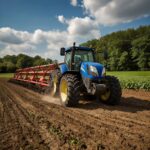Tests and research on plants, animals, fibers, and food and beverage products are performed by agricultural and food science technicians.
Duties of the Agricultural and Food Science Technicians.
Their duties vary depending on their specialty. An agricultural science technician typically does:
- Prepare, analyze, and store crop and animal samples according to protocols.
- Maintenance and operation of farm equipment in accordance with scientific tests.
- Test animals and crops for diseases and other problems.
- Set up and operate laboratory equipment.
- Gather and analyze test results.
- Create charts, reports, and presentations.
- Collection, preparation, and storage of food samples according to protocols.
- Check food, food additives, and food containers for safety.
- Assist food scientists with research, development, and quality control.
- Determine ingredients and formulas from food chemical properties.
- Perform test analysis.
- Prepare reports, presentations, and charts.
- Ensure laboratory chemicals are prepared and maintained.
- Ensure laboratory safety and sterility.
Agronomists often specialize in animal health, farm machinery, fertilizers, agricultural chemicals, or processing technology. Depending on specialization, duties vary.
Agricultural science technicians focus on crop and animal productivity. Analyze samples, test crops and animals for disease, or confirm experiments.
The job of a food science technician in manufacturing is to research new production techniques. They also ensure that products will be distributed or produced efficiently. A food science technician inspects foods, chemicals, and additives to make sure they are safe and have the right ingredients.
Work Environment of the Agricultural and Food Science Technicians.
In 2023, agricultural technicians held 19,600 jobs. A agricultural or food science technician may work in a laboratory, a processing plant, a farm or ranch, or in an office. Working in processing plants and agricultural settings may involve noise, extreme temperatures, and odors from chemicals.
The technician might need personal protective equipment, like hearing protection or gloves. The job may require lifting, carrying, and long periods of physical activity. You may need to travel.
Work Schedules of the Agricultural and Food Science Technicians.
The majority of agricultural and food science technicians work full-time, and some work more than 40 hours per week. A variety of work schedules are available, including evenings and weekends.
The Path to Becoming an Agricultural or Food Science Technician.
There are a variety of entry requirements for agricultural and food science technicians. It is common for employers to require or prefer candidates to have an associate’s or bachelor’s degree in biology, chemistry, agriculture, or a related field. Employers also hire candidates who have a high school diploma or equivalent and related work experience.
Education Requirment of the Agricultural and Food Science Technicians.
Agricultural and food science students should study biology, chemistry, physics, and statistics in high school.
It is typically necessary to hold an associate’s degree to be an agricultural or food science technician, although the requirements vary. The occupation of agricultural and food science technician requires a high school diploma or equivalent and related work experience. It may be necessary for others to earn a bachelor’s degree.
A degree in biology, a physical science such as chemistry, or agriculture are common fields. There are several concentrations within agriculture students can choose from, including animal science, crop science, and food science.
During their studies, students can gain practical experience through internships.
Work Experience in a Related Occupation.
In order to enter the occupation with a high school diploma or the equivalent, workers may need experience in a related occupational field that has helped them develop agricultural or manufacturing skills. Agriculture and food processing are two examples of related occupations.
Training of the Agricultural and Food Science Technicians.
After being hired, agricultural and food science technicians typically receive on-the-job training. While collecting samples, operating equipment, and performing other tasks, they may work alongside a more experienced technician or scientist. Topics such as production techniques and sanitation procedures might also be covered during training.
Important Qualities of the Agricultural and Food Science Technicians.
Analytical skills. A variety of test results and samples must be synthesized by agricultural and food science technicians.
Communication skills. The agricultural and food science technician must be able to understand and give clear instructions, convey information in presentations or reports, and write reports on occasion.
Decision-making skills. To improve food quality, agricultural and food science technicians use reasoning and judgment.
Detail oriented. The agricultural and food science technician must be able to observe and measure accurately and with precision.
Interpersonal skills. Technologists working in agriculture and food science work with scientists, farmers, and food manufacturers.
Physical stamina. It may be necessary for agriculture and food science technicians to stand for long periods of time, lift objects, and perform physical labor.
Salary structures of the Agricultural and Food Science Technicians.
According to May 2023 data, agricultural technicians earned an average of $43,180 per year. In an occupation, the median wage is the wage that is earned by half of the workers and the other half of the workers at the same level. Ten percent of the population earned less than $30,750, and ten percent earned more than $65,470.
It is estimated that the median annual wage for food science technicians will be $49,090 by May 2023. There were 10 percent of workers earning less than $37,290, and 10 percent earning more than $74,630.
Job Outlook of the Agricultural and Food Science Technicians.
There is a projected growth of 7 percent in employment for agricultural and food science technicians from 2023 to 2033, one of the fastest growth rates among all occupations.
Agricultural and food science technicians are expected to have about 6,900 job openings per year over the next decade. These openings are expected to result from workers transferring to different occupations or retiring, among other reasons.
Employment opportunity of the Agricultural and Food Science Technicians
There will continue to be a need for agricultural research on topics such as water resources, pests and pathogens, climate and weather patterns, and biofuels.
Agriculture and food scientists will need agricultural science technicians to investigate and improve livestock diets, living conditions, and genetics. The food science technicians will assist scientists in improving food-processing techniques, preventing food contamination, reducing waste, and shipping food efficiently. It will also continue to be necessary to hire technicians for soil analysis and soil improvement techniques, for finding uses for agricultural byproducts, and for selecting crops that are resistant and taste better. References


